Description
Lee Holden – Qi Gong For Upper Back and Neck Pain
How to Ease — and Prevent — Back Pain with Qi Gong
Not only can the gentle exercise and stretching of Qi Gong alleviate tight, tense back muscles, but Qi Gong can also prevent back pain from occurring in the first place.
What Is Causing My Back Pain?
Four out of five people will experience back pain at some point in their lives.
the Pocket Routine Guide PDF
(requires Adobe Acrobat)
The cause of back pain is difficult to diagnose. In fact, according to a recent article in The New York Times, doctors fail to identify the cause in 85% of the cases they see. That doesn’t make back pain any less uncomfortable or real. Even in a society where an abundance of surgeries and medications promise relief, millions still suffer.
While you should always consult your doctor about your individual situation, it could very well be there isn’t anything special or unique that is causing your pain. A lot of back pain is the result of “everyday living.” Over the years, with the rise in automation and a shift to a knowledge-based economy, Americans live a more sedentary lifestyle, one where sitting or standing for long periods is the norm.
To counter a seated lifestyle, it is important that everyone, regardless of age and fitness level, incorporate some sort of exercise that helps stretch and strengthen the back. Otherwise, energy that flows through the back area becomes blocked and starts to accumulate, manifesting as tension and contributing to stress.
How Can I Get Relief from Back Pain?
While certainly appropriate in many cases, pain medications and surgeries can introduce their own problems, ranging from dependence to infection. In many cases, physicians are now starting to go back to more traditional and holistic treatments for back pain, such as exercise and physical therapy.
In fact, the medical community is now recommending what many of us have known to be effective for back pain all along: Qi Gong.
Qi Gong as a holistic treatment for back pain and back pain prevention can help you:
- Improve posture
- Strengthen back muscles
- Improve flexibility
- Lose weight
- Avoid falls and improve balance
How Does Qi Gong for Upper Back and Neck Pain Work?
The Qi Gong for Upper Back and Neck Pain DVD focuses on the muscles of the upper back, shoulders, and neck. Because these muscles are so large, and they work so hard to support your spine, tension often builds in these areas, and energy becomes blocked.
The soft, slow movements of Qi Gong prevent energy and tension from stagnating and becoming trapped in the upper body.
Deep breathing allows oxygen-rich blood to flow to the muscles and brain, promoting healing and releasing stress.
The serene, meditative movements that are a fundamental part of Qi Gong promote a happier mood, increased creativity, and an improved outlook on life.
The Qi Gong for Upper Back and Neck Pain DVD is broken into two exercise segments: a seated routine, to be performed on the floor, and a standing routine, which requires just about enough room to extend both arms out to your sides.
A Closer Look at the Seated Routine
Deep Neck Stretches
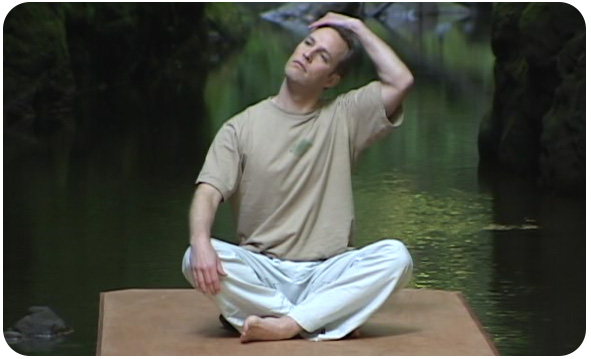
The DVD contains three different types of neck stretches that, when performed, release obstructed energy from the neck and allows it to flow to all parts of the body. The brain receives some of this stored energy, which may account for why many who practice Qi Gong report increased mental acuity. All parts of the body below the neck receive energy as well, providing improved dexterity and coordination.
One of the magical features of these neck stretches is that you can perform them anytime, anywhere. Whether performed while you are seated at your computer or on an airplane, a two-minute Qi Gong break can dramatically change the course of your day, turning stress to relaxation in a matter of minutes.
Among the other highlights of the seated routine:
- Deep abdominal breathing: why something as simple as breathing can be an extraordinary way to reduce tension in the neck and shoulders
- Learn one of the best stretches for reaching the area in between the shoulder blades, a notoriously difficult spot to reach
- “Turtle Stretch”: This wonderfully named movement elongates the neck and back and, like all Qi Gong movements, allows you to stretch only as deeply as is comfortable for you.
A Closer Look at the Standing Routine
Rooster Spreads the Feathers
This may be the best quick release of energy you can perform anywhere, and in under about thirty seconds. The names used in Qi Gong date back literally thousands of years, when hieroglyphics were written on cave walls and referenced our friends in nature to convey ideas and movements. “Rooster Spreads the Feathers” is a great exercise to open the shoulder joints, and you will be amazed at the invigorating energy that this exercise releases.
Additional highlights of the standing routine include:
- Are you an open book? Why the way you breathe reflects the way you feel.
- Silky and smooth joints: What exercise can you perform to release natural lubricants into the joints and keep them loose and pain-free?
- The self-massage: this particular movement helps work the trapezius muscle of the back (and may elicit groans of satisfaction!)
- How the forward bend increases the flow of blood to the brain, improves circulation, and releases tension – and one trick to get even more out of it
- Tingling and buzzing: a shaking movement to release tension, so much so that you can feel it coursing throughout the body afterwards
- The Great Bear Swims in the Ocean: a movement to open the body, especially the all-important area between the chest and upper back, and supply healing energy to the heart and lungs
- Learn how the body can be trained to move with relaxation instead of tightness
- Energized, yet relaxed: a guided meditation that allows you to stand tall, both physically and mentally
- “Cloudy Hands”: a meditative movement in which your hands feel like clouds floating through the sky, while your mind remains grounded in the present
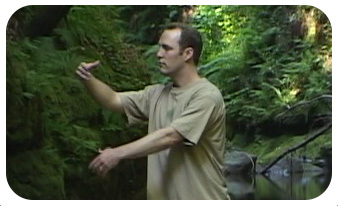
Try A Gentle, Holistic Treatment for Back Pain
The Qi Gong for Upper Back and Neck Pain DVD contains:
- A seated floor routine
- A standing routine, which requires very little space and can easily be performed in your living room, your bedroom, or even in your office
- A bonus partner massage segment: gentle massage techniques to loosen the neck and back and release tension from very specific areas storing blocked energy, also known as knots
- A handy pocket routine guide that lists the movements of each routine – perfect for traveling
- Introductory segment
.jpg)
Lee Holden, whose Qi Gong programs are watched by millions on public television stations all across the country, hosts this beautifully filmed and produced DVD. His calm, comforting voice guides viewers through 40 minutes of stretching, breathing, and meditation. Shot on location in a serene, shaded creek within the cozy confines of moss-covered rocks, it quickly becomes apparent how much influence the flowing movements of nature have on the motions of Qi Gong. And the relaxing musical accompaniment, featuring the soft, ancient sounds of Eastern wind instruments, make transporting yourself to your own private place of healing easy when you watch this DVD.
Order Qi Gong for Upper Back and Neck Pain, featuring Lee Holden, now!
![]()
Qi Gong for Upper Back and Neck Pain
Sequence of Movements
Seated
- Deep Abdominal Breathing
- Neck Stretch Side to Side
- Palm Press Out to Sides, Neck Stretch
- Hold Finger Tips Together, Neck Stretch
- Dragon Twist, Neck Stretch
- Turtle Stretch for Upper Back
- Forward Bend To Open Spine
- Palms on Feet, Forward Bend Upper Back Stretch
Standing
- Deep Abdominal Breathing
- Twist and Rotate, Upper Back Mobility
- Palms Behind Back, Neck Stretch
- Rooster Spreads Feathers, Joint Mobility
- Shoulder Shrugs
- Palm Press and Rotate, Neck Stretch
- Forward Bend Neck Massage
- Stretching Flow, Opening Lines of Tension
- Shaking to Clear Tension
- Great Bear Swins
- Tai Chi Opening
- Three Treasures Flow
- Cloudy Hands
- Flying
- Bamboo in the Wind
![]()
QiGong (pronounced “chee gong” and alternatively spelled as “qigong,” “qi gong,” or “chi kung”) is sometimes called the new yoga – but the practice dates back thousands of years to ancient China. The word qi (or chi) means life force or “vital energy of the body,” and gong means accomplishment or skill that is cultivated through steady practice. Qi Gong is specifically designed to cultivate the body’s vital energy, using it to heal and strengthen every system throughout the body. Thus, qi gong means cultivating energy, and it involves working with energy to strengthen and cleanse the body. Using these Qi Gong DVDs, CDs, and videos will improve your relaxation, reduce pain, and improve your health.
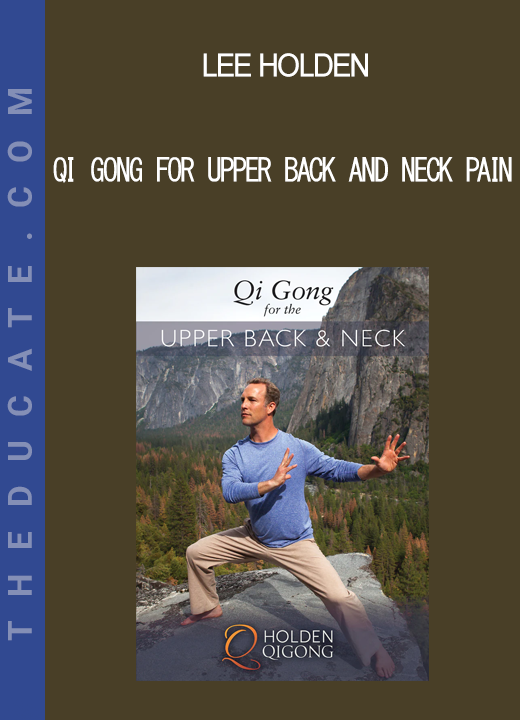

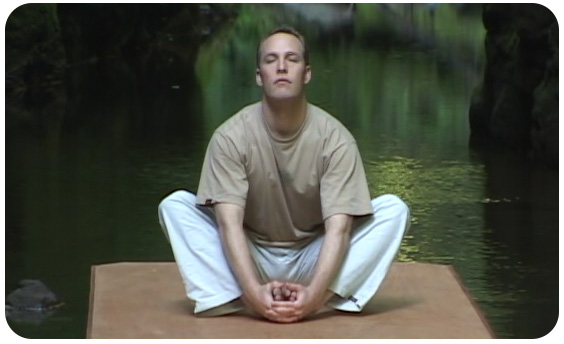
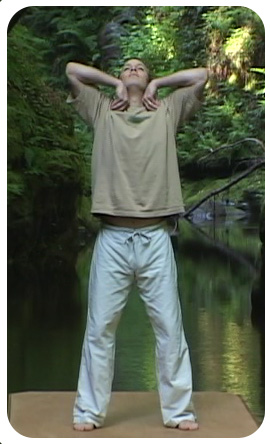

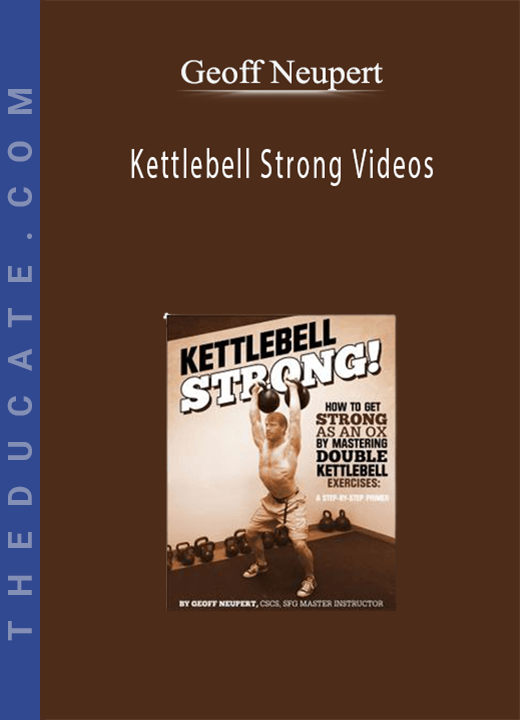
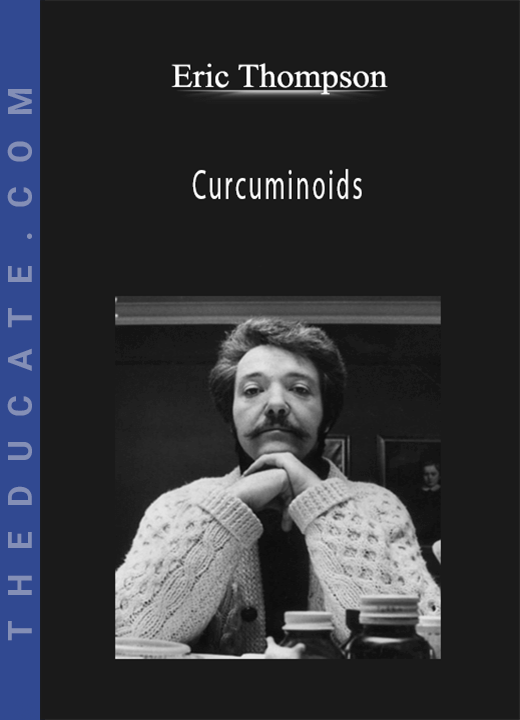
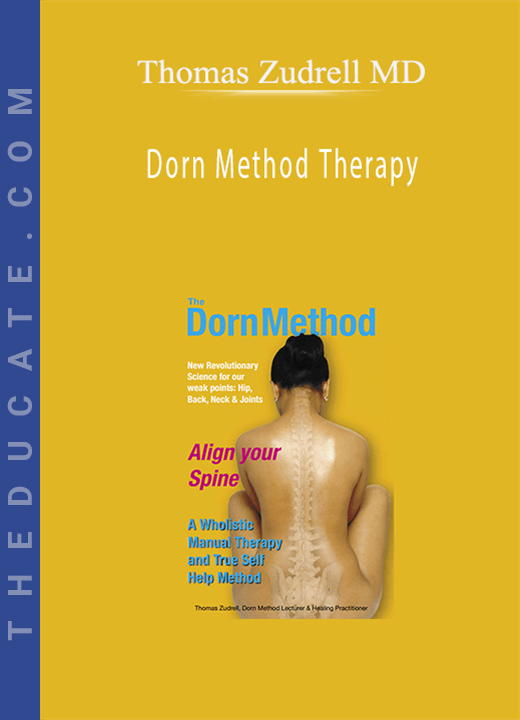
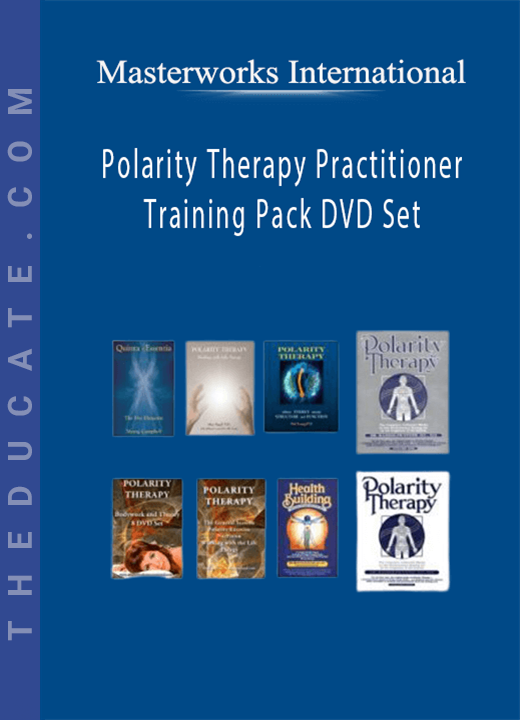
Reviews
There are no reviews yet.